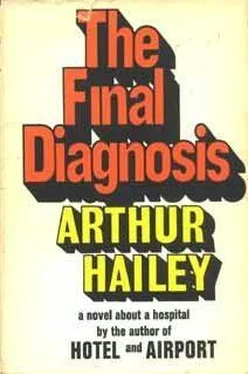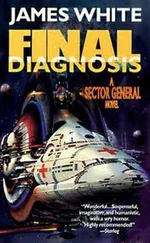Arthur Hailey - The Final Diagnosis
Здесь есть возможность читать онлайн «Arthur Hailey - The Final Diagnosis» весь текст электронной книги совершенно бесплатно (целиком полную версию без сокращений). В некоторых случаях можно слушать аудио, скачать через торрент в формате fb2 и присутствует краткое содержание. Жанр: Триллер, на английском языке. Описание произведения, (предисловие) а так же отзывы посетителей доступны на портале библиотеки ЛибКат.
- Название:The Final Diagnosis
- Автор:
- Жанр:
- Год:неизвестен
- ISBN:нет данных
- Рейтинг книги:4 / 5. Голосов: 1
-
Избранное:Добавить в избранное
- Отзывы:
-
Ваша оценка:
- 80
- 1
- 2
- 3
- 4
- 5
The Final Diagnosis: краткое содержание, описание и аннотация
Предлагаем к чтению аннотацию, описание, краткое содержание или предисловие (зависит от того, что написал сам автор книги «The Final Diagnosis»). Если вы не нашли необходимую информацию о книге — напишите в комментариях, мы постараемся отыскать её.
The Final Diagnosis — читать онлайн бесплатно полную книгу (весь текст) целиком
Ниже представлен текст книги, разбитый по страницам. Система сохранения места последней прочитанной страницы, позволяет с удобством читать онлайн бесплатно книгу «The Final Diagnosis», без необходимости каждый раз заново искать на чём Вы остановились. Поставьте закладку, и сможете в любой момент перейти на страницу, на которой закончили чтение.
Интервал:
Закладка:
Removed from the incubator, the pink-tinged surface of the prepared petri dishes showed small, moist bacteria colonies where the tiny amounts of human feces had been added the previous day. With every individual stool containing millions of bacteria, the next task was to separate those colonies which were obviously harmless from those which must be investigated further.
Pink-tinged colonies of bacteria were eliminated at once as harboring no typhoid. Pale colonies, where typhoid bacilli might conceivably lurk, had samples taken from them for subculture in sugar tubes with liquid media. There were ten sugar tubes to each original culture, each tube containing a different reagent. It was these reagents which, after further incubation, would finally show which stool sample, if any, contained the marauding and infectious typhoid germs.
Now, on the fourth day, all the stool samples were finally in. They had been obtained from everyone on the hospital staff involved in any way with the receiving, preparation, or distribution of food, and the task of processing them would continue until well into tomorrow. At the moment the 280 subcultures which John Alexander had referred to were distributed in racks around the lab and in incubators. But although on many of these the final checks were complete, none so far had revealed the individual—the suspected typhoid carrier—whom, anxiously and diligently, they had been seeking day and night.
The telephone bell rang and Pearson, nearest to the lab wall phone, answered it. “Yes?” He listened, then said, “No; nothing yet. I keep telling you—I’ll call as soon as we find anything.” He replaced the instrument.
John Alexander, succumbing to a sudden tiredness, completed an entry on a data sheet, then dropped into a straight-back lab chair. Momentarily he closed his eyes with relief at his own sudden inactivity.
From alongside David Coleman said, “Why don’t you take an hour or two off, John—maybe go upstairs and stay with your wife for a while?”
Alexander got to his feet again. He knew that if he remained seated too long he could easily fall asleep. “I’ll do one more series,” he said, “then I think I will.”
Taking a rack of subcultures from the incubator, he collected a fresh data sheet and began to line up the ten sugar tubes he was about to check. Glancing at the lab wall clock, he noted with surprise that another day was running out. The time was ten minutes to five.
Kent O’Donnell replaced the telephone. Answering Harry Tomaselli’s unspoken question, he said, “Joe Pearson says there’s nothing new.”
In the administrator’s birch-paneled office there was a silence, both men bleakly aware of the implications of this latest lack of news. Both knew, too, that around them, outside the administration suite, the work of the hospital was grinding to a halt.
Since early afternoon the plan for contraction of patient service, devised by Harry Tomaselli several days earlier and now made necessary by the impending shutdown of the hospital kitchens, had been going steadily into effect. Commencing with breakfast tomorrow, one hundred meals for patients on regular diet would be prepared by two local restaurants, combining forces for the occasion, and would be delivered to the hospital for seriously ill patients who could not be moved. Of the remaining patients, as many as possible were being discharged to their homes, while others, for whom hospital care was still essential, were being transferred to other institutions in and around Burlington, now mobilizing their own facilities to meet the emergency influx from Three Counties.
An hour ago, knowing that the process of transfer would have to continue far into the night, Harry Tomaselli had given the order for evacuation to begin. Now a line of ambulances, summoned by telephone from all available points, had begun to assemble outside the emergency entrance. Meanwhile, in the wards and private pavilion, nurses and doctors were working briskly, moving patients from beds to stretchers and wheel chairs in readiness for their unexpected journey. For those with time for thinking it was a sad and somber moment. For the first time in its forty-year history Three Counties Hospital was turning the sick and the injured away from its doors.
There was a light tap, and Orden Brown entered the administrator’s office. He listened attentively while Harry Tomaselli reported what had been done since their meeting four hours earlier. At the end the board chairman asked, “The city health authorities—have they been here again?”
“Not yet,” Tomaselli answered. “We’re expecting them now.”
Orden Brown said quietly, “Then if you don’t mind, I’ll wait with you.”
After a pause the board chairman turned to O’Donnell. “Kent, this isn’t important now, but I’ll tell you while I think of it. I’ve had a call from Eustace Swayne. When all this is over he would like you to go and see him.”
For an instant the effrontery of the request left O’Donnell speechless. It was obvious why Eustace Swayne wanted to talk with him; there could be only one reason—despite everything the old man intended to use his money and influence in an attempt to intercede for his friend, Dr. Joseph Pearson. After all that had happened over the past few days it seemed unbelievable that such blindness and presumption could exist. A boiling fury seethed within O’Donnell. He said explosively, “To hell with Eustace Swayne and all his works!”
“May I remind you,” Orden Brown said icily, “that you happen to be speaking of a member of the hospital board. Whatever your disagreements, he at least is entitled to be treated with courtesy.”
O’Donnell faced Orden Brown, his eyes blazing. Very well, he thought, if this is the showdown, then let’s have it. I’ve finished with hospital politics—for good and as of now.
At the same moment a buzzer sounded on the administrator’s desk. “Mr. Tomaselli,” a girl’s voice said on the intercom, “the public-health officers have just arrived.”
It was three minutes to five.
As they had on a morning six weeks earlier—the day on which, as he realized now, Kent O’Donnell had received his first warning of impending disruption in the hospital—the chimes of the Church of the Redeemer announced the hour as the small group threaded its way through the corridors of Three Counties. Led by O’Donnell, it included Orden Brown, Harry Tomaselli, and Dr. Norbert Ford, city health officer of Burlington. Behind them were Mrs. Straughan, the chief dietitian, who had arrived at the administration suite as they were leaving, and a young assistant health officer whose name O’Donnell had missed in the flurry of introductions.
Now that his initial anger was over, the chief of surgery was relieved that the interruption of a few minutes ago had prevented what could have become a major quarrel between himself and Orden Brown. He realized that all of them, himself included, had become unnaturally tense over the past few days, and the board chairman had, after all, done no more than relay a message. O’Donnell’s real quarrel was with Eustace Swayne, and he had already resolved to meet the old tycoon face to face as soon as this present business was over. Then, whatever overtures Swayne chose to make, O’Donnell planned to respond with plain, blunt words, no matter what the consequences might be.
It had been Kent O’Donnell’s suggestion that the group should visit the pathology department. He had told the city health officer, “At least you’ll see we’re doing everything possible to trace the source of infection.”
Dr. Ford had at first demurred. “There’s been no suggestion that you’re not, and I doubt if I could add anything to what your pathologists are doing,” he had said. But at O’Donnell’s insistence he had agreed to go, and now they were en route to the basement pathology lab.
Читать дальшеИнтервал:
Закладка:
Похожие книги на «The Final Diagnosis»
Представляем Вашему вниманию похожие книги на «The Final Diagnosis» списком для выбора. Мы отобрали схожую по названию и смыслу литературу в надежде предоставить читателям больше вариантов отыскать новые, интересные, ещё непрочитанные произведения.
Обсуждение, отзывы о книге «The Final Diagnosis» и просто собственные мнения читателей. Оставьте ваши комментарии, напишите, что Вы думаете о произведении, его смысле или главных героях. Укажите что конкретно понравилось, а что нет, и почему Вы так считаете.












